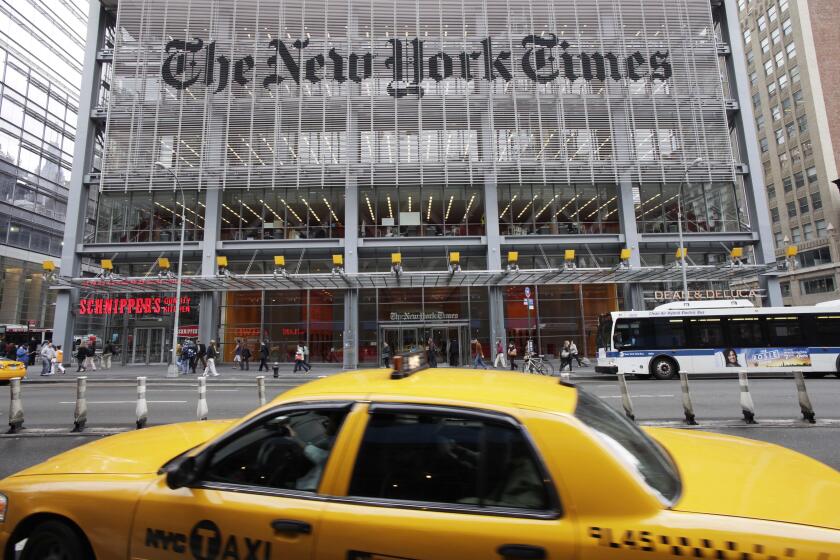Commentary: Why the controversy around âUnited States of Alâ is overblown
You could have set a watch to the negative reaction around Chuck Lorreâs new CBS sitcom, âThe United States of Al,â when a 30-second teaser dropped last week ahead of the showâs premiere on Thursday.
Criticisms popped up immediately on Twitter, lamenting the seriesâ use of well-worn tropes in depictions of Middle Easterners, South Asians and Muslims on TV: The brown, Afghan lead character is a damaging stereotype. A non-Afghan actor is playing an Afghan. Thereâs only one brown person in the trailer. And oh no, here we go with another âwhite saviorâ narrative.
The irony: The multi-camera sitcom is the most mainstream effort so far among the handful of comedies (âRamy,â âMaster of None,â âPatriot Act with Hasan Minhajâ ) that feature folks from largely Muslim regions or Muslim family backgrounds. The four episodes of âUnited States of Alâ made available for review are many things â funny, goofy, corny, sometimes entertaining and sometimes uneven â but theyâre hardly in line with the offensive tropes of â24,â âHomelandâ or âWonder Woman: 1984.â
Rukmini Callimachiâs New York Times podcast âCaliphateâ relied on stereotypes and lazy tropes to attract listeners. In post-9/11 America, it was an easy sell.
The series follows veteran Riley (Parker Young) and his brother-in-arms, Afghan interpreter Awalmir, or Al (Adhir Kalyan). The men served alongside each other against the Taliban. Now Al has made his way to the U.S. with Rileyâs help and both are living in Rileyâs fatherâs Ohio home, trying to carve out their new, postwar lives. They are an odd couple: Al is hyper-competent and unapologetically dorky while Riley is goodhearted and less ambitious, presenting like a hunky male model. Each is the yin to the otherâs yang, helping and annoying each other. But their perilous time on the battlefield is nothing compared to the tightrope these characters walk between cancel culture and mainstream comedy.
The negative reaction to âUnited States of Alâ illustrates the minefield that exists around good-intentioned efforts to diversify scripted television. The complaints around the showâs teaser are understandable and almost Pavlovian thanks to years of terribly racist portrayals of Pakistanis, Iraqis, Iranians or folks from any other region the U.S. has invaded, manned deadly drones or labeled a player in the Axis of Evil.
The premature backlash around âUnited States of Alâ may be just as damaging to future representations of Muslims on TV as the old Omar the Terrorist tropes. Lambasting of the show before it even airs sends a message to networks that they canât win with stories about Afghans or Syrians or whoever faces Mecca to pray, no matter how much thought or effort they put into âgetting it right.â
Created and written by David Goetsch and Maria Ferrari, who executive produce the show with Reza Aslan and Mahyad Tousi, the show features five Afghan characters, four of whom are played by Afghans. The production employed four Afghan writers and producers to help steer the narrative and actor Adhir, who is South Asian and grew up in South Africa.
From âCountry Comfortâ to âUnited States of Al,â the sitcom â especially when thereâs a family at the center â is still a vital place to see ourselves on TV.
Jokes about Americaâs involvement overseas abound, as do cracks about how little Al had back home as a child compared to Rileyâs daughter, Hazel (Farrah Mackenzie). He played soccer with a rock or something, comments Rileyâs family, who include his father (Dean Norris), who is himself a veteran; his sister Lizzie (Elizabeth Alderfer), who lost her fiancĂŠ in the line of duty; and his young daughter. Riley recently separated from his wife Vanessa (Kelli Goss).
Alâs conundrums and bouts of culture shock revolve around things like Americansâ disrespect for their elders, wearing oneâs outside shoes into the house and women donning shorts in public, comic moments that feed off stereotypes in order to lampoon those blanket generalizations. He is the conscience of the story, and the clown and the heart.
âUnited States of Alâ is not a breakthrough masterpiece, but it is a step toward mainstreaming Middle Eastern and Muslim narratives. Thereâs plenty to interpret as offensive if thatâs what youâre looking for but when turned another way, these moments are an effort to let the air out of long-standing tropes. Whether the show succeeds or not is yet to be seen, but itâs worth giving it a chance beyond a 30-second trailer.
âUnited States of Alâ
Where: CBS
When: 8:30 p.m. Thursday
Rating: TV-PG (may be unsuitable for young children)
More to Read
The complete guide to home viewing
Get Screen Gab for everything about the TV shows and streaming movies everyoneâs talking about.
You may occasionally receive promotional content from the Los Angeles Times.






